
1 minute read
Honeyfields
New Fabulous Feeders for Wild Birds
Honeyfield’s are known for their impressive range of wild bird foods that guarantee to bring more colorful birds to your garden. With a track-record of also supplying quality wild bird feeders, these new innovative feeding solutions will be available for 2023, ready to provide a range of sustainable products to customers wild bird offerings.

WHM Pet Group
Email: sales-support@marriagesmillers.co.uk 01430 875853. www.honeyfieldswildbird.co.uk Give the birds shelter when feeding with the Honeyfield’s Little Lodge Feeder

With a stylish grey roof, this Feeder offers a canopy over the feeding tray for extra shelter. Ideal for involving children in the joys of bird feeding, the lodge detaches easily for efficient cleaning. The Feeder is also easy to fill, via the removable ‘chimney’ hatch. Made from a high proportion of recycled plastic, it can be easily situated on a pole or balcony, using the useful holes on the base of the Feeder.
Feed the birds in style with the hard-wearing Honeyfield’s Metro Feeder
Perfect for all wild bird enthusiasts, this elegant range of Bird Feeders offer a modern collection of stylish light green Feeders. With an easy fill design there are five Feeder variations to collect – Seed & Nyjer with transparent casing and Peanut, Sunflower Hearts & Fatball Feeders with a grey mesh, adding a contemporary two-tone look.
Support wildlife and the ecosystem with the Honeyfield’s & Wildlife and Birdcare’s Insect and Bug Hotels
Made in the UK with FSC certified UK larch, the bug hotels feature thick timber walled compartments, filled with natural foraged twigs, logs and pinecones, collected from wildlife trust land and local forests. The bug hotels benefit a variety of minibeast and insects such as Ladybirds, Bees, Spiders, and Woodlice. Minibeasts use the hotels as a safe space to shelter, lay their eggs, raise their young, and seek refuge from predators. The unique bug hotels are hand crafted in Staffordshire by people with learning disabilities.












